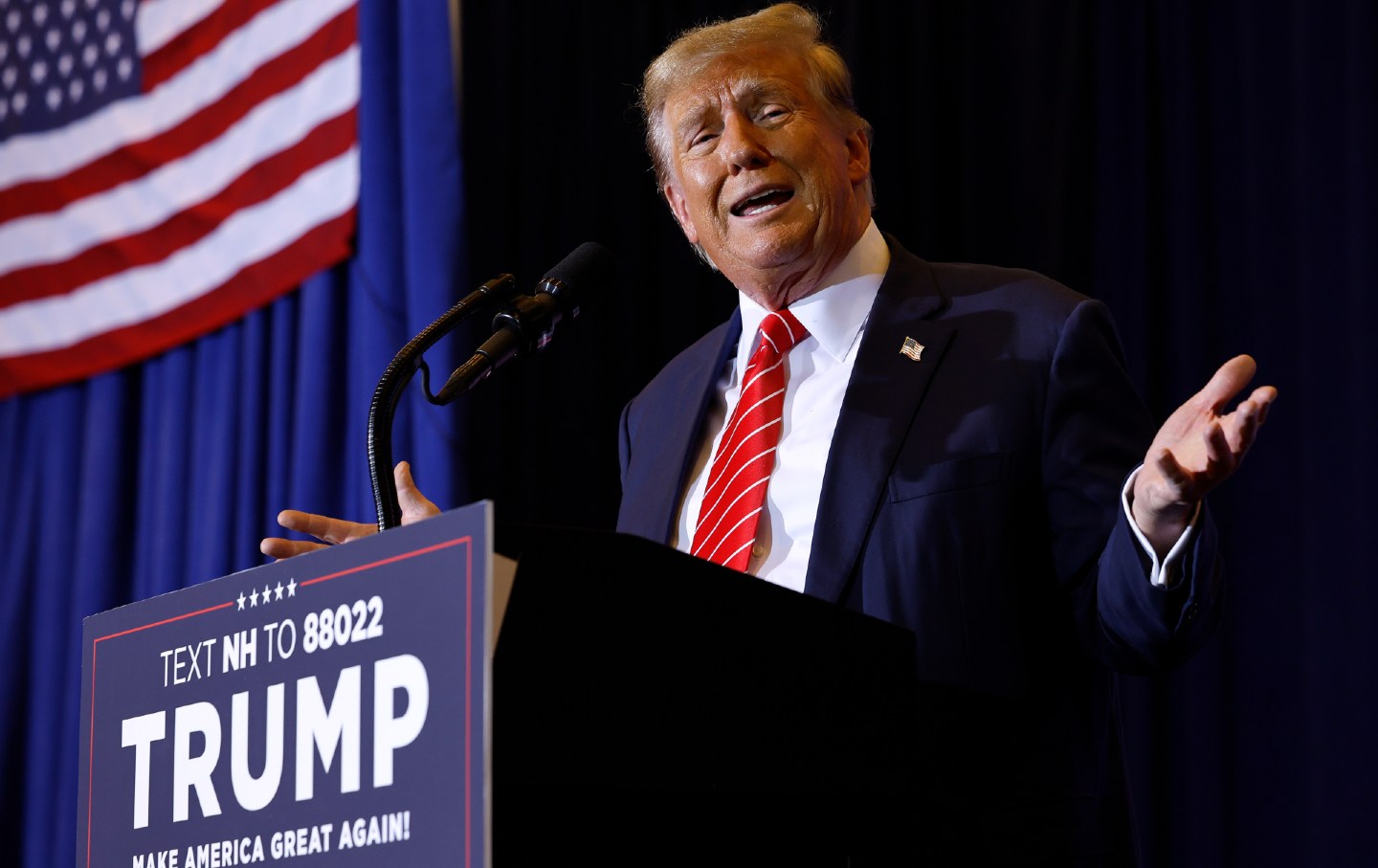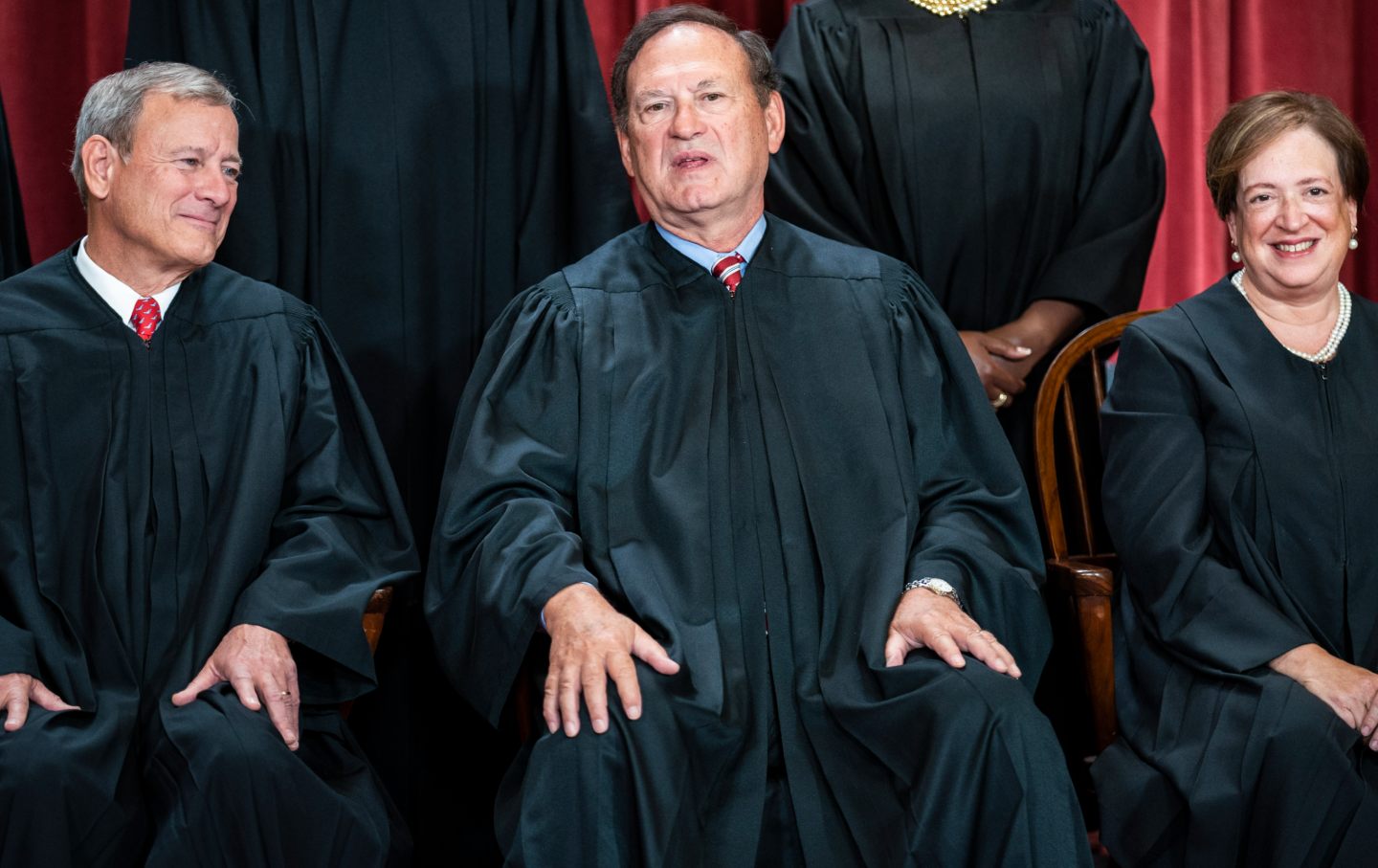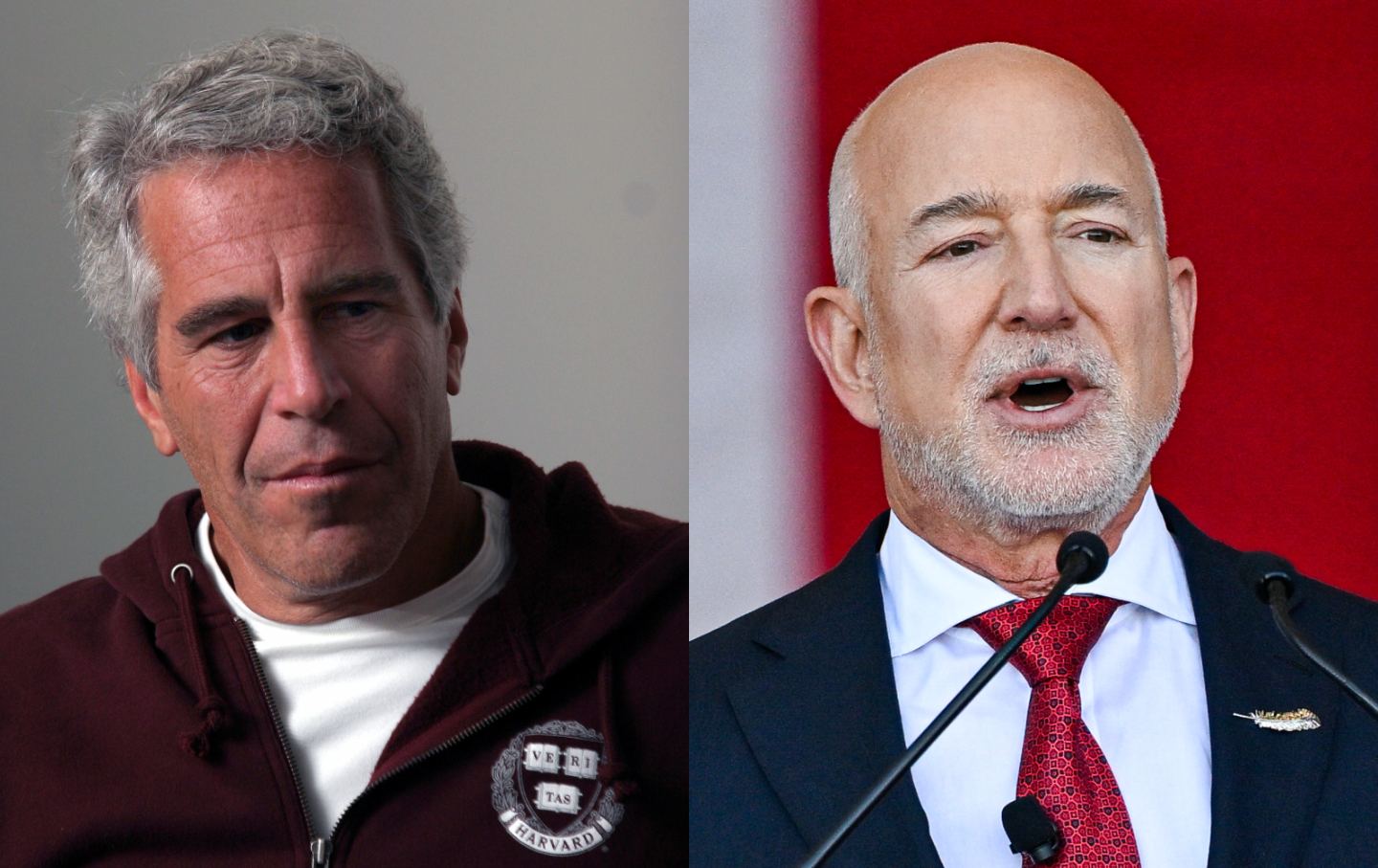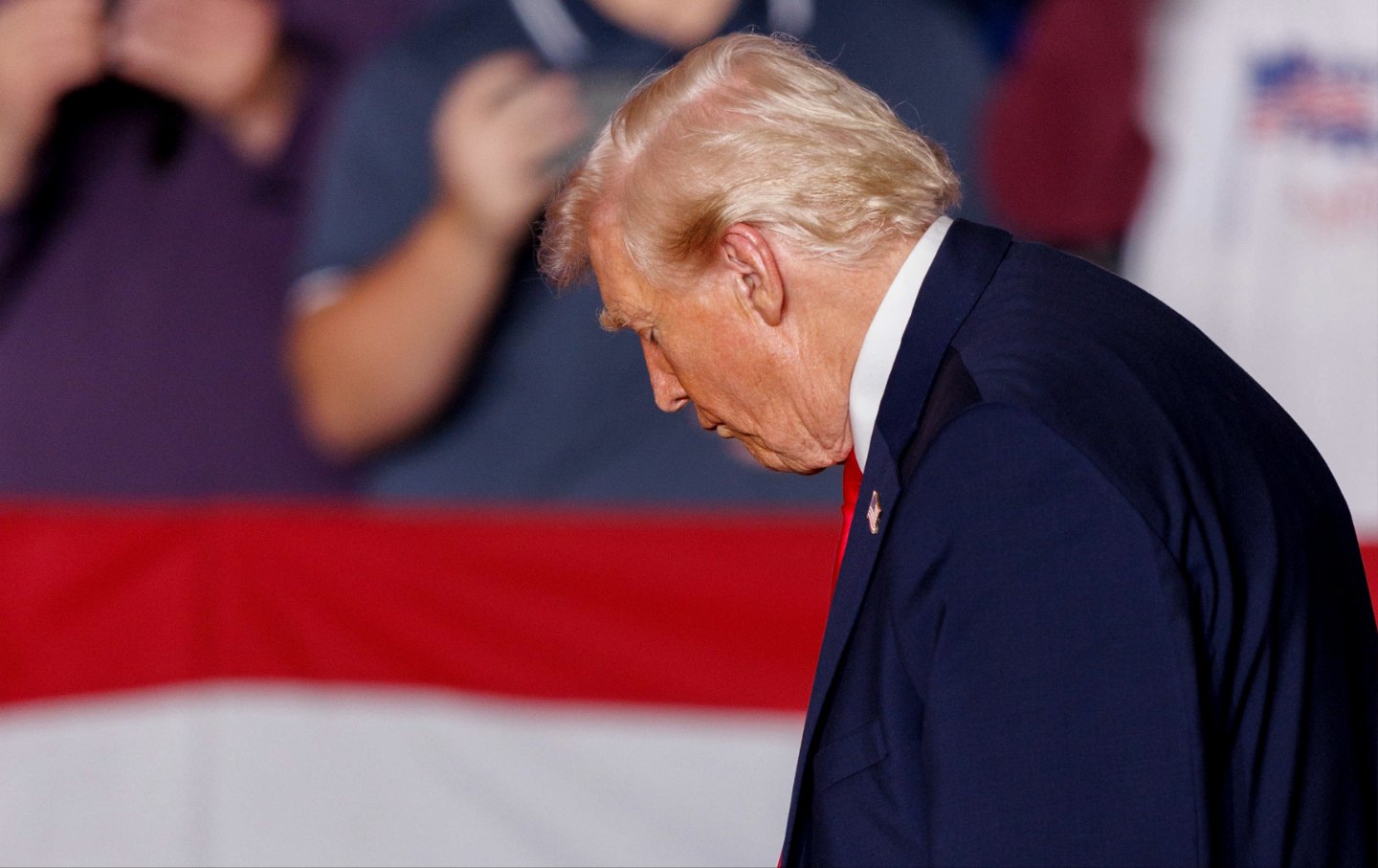The D.C. Circuit Just Shredded Trump’s Immunity Claims
The court’s decision should put to rest the question of whether a former president is immune to prosecution. The question is whether the Supreme Court will allow that.

Republican presidential candidate and former president Donald Trump speaks during a campaign rally on January 19, 2024, in Concord, N.H.
(Chip Somodevilla / Getty Images)The United States Court of Appeals for the District of Columbia issued its long-awaited ruling yesterday on Donald Trump’s claim to be absolutely and forever immune from criminal prosecution. As expected, the three-judge panel unanimously rejected Trump’s argument, because his argument is obviously wrong, logically fallacious, and places the president of the United States above the rule of law.
The 57-page opinion was a complete and utter rejection of all of Trump’s claims. The former president argued that “presidential immunity” (which shields a sitting president from prosecution by his or her own government) continues after the president leaves office. The court said no. Trump also argued that a president’s actions (including crimes) cannot be reviewed by courts because such reviews violate the separation of powers. The court once again said no. Trump further argued that presidents can only be prosecuted after they have been impeached by the House and convicted in the Senate. The court said no. And Trump argued that his second impeachment trial was effectively a legal trial and therefore, under the rules of double jeopardy, he cannot be prosecuted twice for the same bad acts. The court, again, said no.
I would have written the opinion in one paragraph, and closed it by saying, “I award you no points, and may God have mercy on your soul.” But the court opted to say “no” to all of these ridiculous claims in style. It was a full “benchslap”—a ruling that goes out of its way to show that the arguments made by the loser are wrong, incoherent, and ignorant of prevailing laws and precedents. The court pointed out that Trump was “citizen Trump,” entitled to no more or less than any other criminal defendant. It laughed off the suggestion that prosecuting Trump would have a “chilling effect” on future presidents who may want to commit crimes, noting that every other president has understood themselves to be subjected to crimnal laws after they leave office (citing Richard Nixon’s need for pardon to protect him from further prosecution and Bill Clinton’s agreement to suspend his law license) and saying that post-office prosecution serves the “structural benefit” to “deter possible abuses of power.” The court even called Trump’s reading of the impeachment clause “tortured” and used the words of his own impeachment lawyer, as well as Senator Mitch McConnell, to underscore the point, made during Trump’s second impeachment trial, that Trump could still be held accountable by criminal courts after a Senate acquittal.
My favorite part of the ruling came when the court stepped back and simply acknowledged the wackadoodle world Trump thinks we should live in. The whole opinion can be summarized by this sentence: “It would be a striking paradox if the President, who alone is vested with the constitutional duty to take Care that the Laws be faithfully executed, were the sole officer capable of defying those laws with impunity.”
It’s a really good opinion. But… it took them over a month to write. It’s important to remember that Trump’s arguments are not designed to win: No reasonable person actually thinks that presidents are free to commit crimes! Trump’s arguments are designed to delay his prosecution and the reckoning special prosecutor Jack Smith has in store for him.
This case has already caused that delay. District Court Judge Tanya Chutkan rejected these ridiculous claims of immunity all the way at the beginning of December but had to push back her March 4 trial start date to accommodate Trump’s appeal.
The D.C. Circuit says that Trump has until Monday, February 12, to appeal this decision to the Supreme Court. If he does, and the court grants a stay, then Trump’s trial is still delayed. But if he doesn’t, the stay imposed by the D.C. Circuit will lapse and Judge Chutkan will be able to resume her trial schedule. This is important, because it effectively cuts off an “en banc” appeal to the full D.C. Circuit. One Trump option might have been to try to get the 11-member D.C. Circuit to rehear the case and issue a different ruling from the three-judge panel, or hope that one of his appointees on the circuit would drag things out with a lengthy, unhinged dissent. (“Lengthy, unhinged dissent” is the code name for D.C. Circuit judge Neomi Rao among my people.) The panel was having none of that: They told Trump, “Supreme Court or bust.”
Unfortunately, the Supreme Court hosts three Trump justices, plus one justice, Clarence Thomas, whose wife supported the coup, and another justice, Samuel Alito, who hates liberals, women, decency, and probably puppies with every fiber of his being. The Supreme Court doesn’t have to hear this appeal, and it shouldn’t because the legal arguments here are beyond ridiculous. Even if it does hear the appeal, it doesn’t have to capitulate to Trump’s delaying tactics and stop Judge Chutkan from moving forward with scheduling the trial. But it takes only four justices to hear a case, and there are enough conservative justices on the court who might be willing to give Trump additional opportunities to stop the wheels of justice from rolling over him. The Supreme Court could gobble up enough time to delay the start of Trump’s trial for months, even perhaps pushing it beyond the November presidential election. And if he wins that election, he’s back to being unprosecutable while in office, and will probably pardon himself for good measure.
The D.C. Circuit opinion is very tight. I’d say it’s explicitly written in a way to discourage Supreme Court review. The opinion liberally quotes from conservative justices, using the very words of people like Neil Gorsuch, Clarence Thomas, Antonin Scalia, and alleged attempted rapist Brett Kavanaugh to buttress their ruling. And I will emphasize again that Trump’s core argument here—that presidents are immune forever from prosecution after they leave office, even if they commit actual crimes while in office, is a position that is so antagonistic to the idea of the rule of law that it was rejected by Oliver Cromwell and pretty much every democracy ever since. The Supreme Court should reject Trump’s appeal and allow Judge Chutkan to resume her work.
But the Heisenberg Uncertainty Principle tells us that you can never predict what six conservative hacks, energized by Fox News and Federalist Society legal theory, are going to do. What the Supreme Court should do and what they’re willing to do are two different things.
If this case does get to the Supreme Court, and if the justices rule on the merits, Trump will lose. (I think 7-2 with Thomas and Alito dissenting, but I could also see it being 9-0 because Trump’s argument is that bad.) The question is not, and has never been, whether Trump is right about this. The question is only whether the Supreme Court will let Trump be wrong long enough to allow him to go through another presidential election without being held accountable for his actions.
That question very much remains open, even after the D.C. Circuit ruling. We’ll know the answer soon. Let’s hope it’s soon enough.
Your support makes stories like this possible
From Minneapolis to Venezuela, from Gaza to Washington, DC, this is a time of staggering chaos, cruelty, and violence.
Unlike other publications that parrot the views of authoritarians, billionaires, and corporations, The Nation publishes stories that hold the powerful to account and center the communities too often denied a voice in the national media—stories like the one you’ve just read.
Each day, our journalism cuts through lies and distortions, contextualizes the developments reshaping politics around the globe, and advances progressive ideas that oxygenate our movements and instigate change in the halls of power.
This independent journalism is only possible with the support of our readers. If you want to see more urgent coverage like this, please donate to The Nation today.








